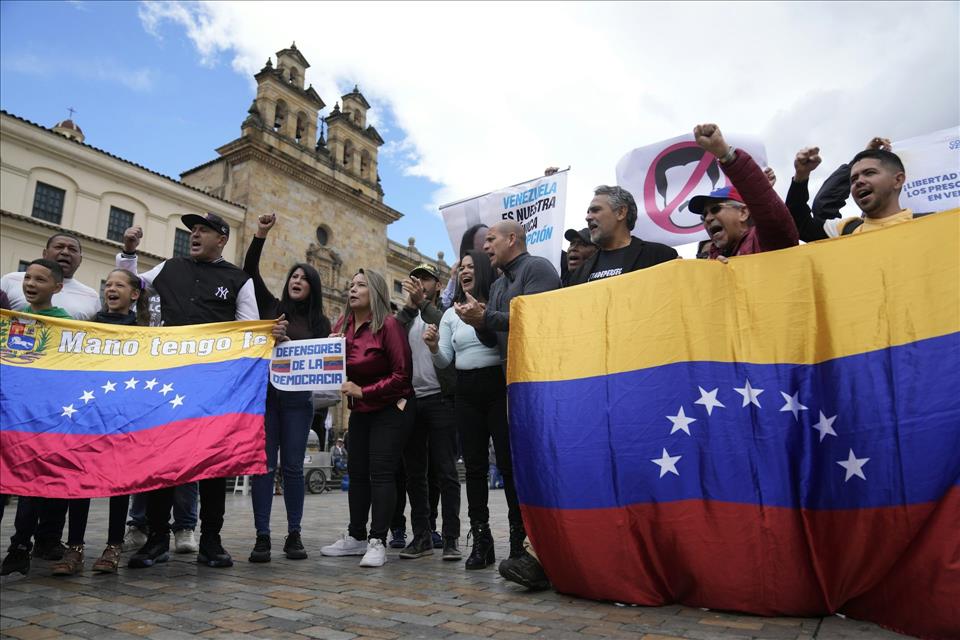
The Votes Of Venezuelans Abroad Are Being Suppressed
However, Venezuelans abroad have encountered barriers registering and voting . Only 69,000 Venezuelans living abroad are registered to vote . This poses serious problems for the country's electoral and democratic processes.
Venezuela has experienced the world's largest migration crisis in recent decades. Economic instability has seen millions leave the country. Figures indicate that close to 7.8 million Venezuelans - over one-quarter of the population - have left the country.
Given the high number of Venezuelans who live outside of the country, it is crucial that those in the diaspora are able to take part in the country's electoral process. However, many face significant challenges when seeking to exercise their right to vote.
Venezuelans gather at their country's consulate in Bogotá, Colombia to ask about voting requirements and procedures for this year's presidential election, on April 11, 2024. (AP Photo/Fernando Vergara) Legal and diplomatic barriers
Whether the election will be free and fair remains to be seen. Maduro has pledged to allow democracy to function. However, many of his actions suggest otherwise . Opposition politician Maria Corina Machado has been disqualified from running and the government has rescinded invitations for EU election observers .
In a world where transnational movement is widespread, protecting international voter participation is essential. Most South American countries have enacted legislation allowing citizens abroad to participate in presidential elections.
Venezuela enshrined this in a 1997 law , that allowed citizens abroad to use a valid identification card or passport to register and vote at a Venezuelan consulate or embassy. The 1998 election, which saw Hugo Chavez elected president, was the first time Venezuelans abroad could vote. In 2009, during Chavez's third term, the law was repealed and replaced with a new bill that allows the National Election Council to determine, for each election, the processes for Venezuelans to vote from abroad.
Current legislation establishes that only individuals with legal residence or“any other legal status that denotes a lawful stay” can vote abroad.
However, the term“legal residence” is not defined in the current legislation nor has it been defined by the National Election Council. This has resulted in different Venezuelan diplomatic missions using various interpretations. It has been used as a tactic to impede voter registration.
For example, millions of Venezuelans live legally in neighbouring Colombia. However, Venezuela does not recognize this“legal” residence because it does not imply“permanent” residence .
Some diplomatic missions now require solely a valid passport to register and vote, something many Venezuelans abroad do not have. If their passport has expired, renewing it is often too costly and requires a trip to a distant embassy or even to Venezuela.
Venezuelan President Nicolás Maduro speaks to supporters during a campaign rally in the capital Caracas on July 18, 2024. (AP Photo/Ariana Cubillos)
A lack of diplomatic missions is another major impediment. In the past decade, the government has severed diplomatic relations with various countries that host large numbers of Venezuelans.
Venezuela closed consulates in Canada and Colombia in 2019 (though it has since reopened some) and its embassy and consulates in Ecuador in 2024 .
The Venezuelan government typically argues diplomatic motives for these closures . It closed its embassy in Ecuador (a country that hosts over half a million Venezuelan migrants ) in solidarity with Mexico after Ecuadorian authorities raided the Mexican embassy in April 2024.
Regardless of the reason, these closures deprive Venezuelans abroad of access to a voting location in their country of residence. They are also denied the ability to renew or obtain documents required to register and vote.
For those seeking to vote, the remaining option is to return to Venezuela. But that can be costly, and for those vocally critical of the government, potentially dangerous.
Venezuelans pessimistic about the electionIn June and July we spoke to Venezuelans in Brazil and Colombia who we interviewed for ongoing research into the humanitarian reception of vulnerable migrants in Brazil and Colombia.
Their comments on the election reflected both pessimism and hope for change. Blanca Montilla, President of Casa Venezuela, an NGO that supports Venezuelan migrants and refugees in Sao Paulo, said:“Although we are seeing some disruptions and persecution to the opposition candidate, many things that make us think this election is not free, we still have hope.”
Venezuelans living abroad also expressed distrust in the process of voting from outside the country. Romulo Bordones said:“Those who count votes in this election process are the same people from the government, so there is not much to say.” Symone Eman told us voting abroad raises a lot of doubts about the legitimacy of your vote. He fears his vote might not be counted and worries about whether or not it will remain secret.
It is essential to address barriers that hinder diasporic communities from participating in elections back home. The Venezuelan experience illustrates how governments can too often suppress the rights of voters abroad. It highlights the critical need to enhance and protect voters' rights for those outside their country.
Democracies must establish and follow consistent criteria for voter registration abroad, preserve and expand diplomatic missions in countries with large diasporas and strengthen voter trust by allowing international observers and independent auditing.
The International Organization for Migration, for example, is an agency that supports out-of-country voting processes for citizens of various countries. By learning from these experiences and implementing accessible trans-electoral policies, the democratic rights of all citizens can be protected, regardless of location.

Legal Disclaimer:
MENAFN provides the
information “as is” without warranty of any kind. We do not accept
any responsibility or liability for the accuracy, content, images,
videos, licenses, completeness, legality, or reliability of the information
contained in this article. If you have any complaints or copyright
issues related to this article, kindly contact the provider above.
















Comments
No comment